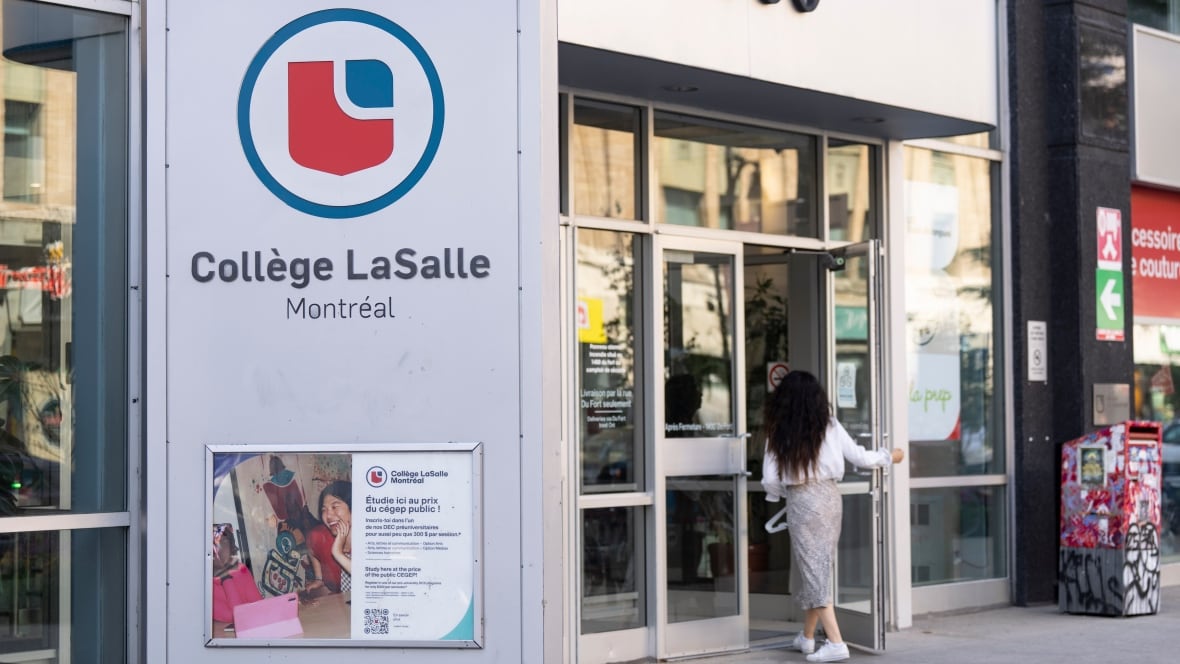Education
LaSalle College Alters Student Status to Meet Quebec Language Quotas

Dozens of students at LaSalle College in Montreal have been unexpectedly transitioned from full-time to part-time status just weeks before classes begin. This shift results from the institution’s efforts to comply with Quebec’s stringent language reform regulations, specifically the Charte de la langue française. The changes have left many students, including Alex Abraham, facing uncertainties regarding their educational and professional futures.
Abraham, 33, was preparing to enter the final year of his network management program when he received an email notification about the change. “I was shocked,” he stated, expressing his dismay over the abrupt alteration to his academic status. Part-time students are not eligible for Canada’s post-graduation work permit and face restrictions on off-campus employment, which complicates their financial situations significantly. “How can I meet my expenses?” he added, highlighting the immediate impact on his livelihood.
LaSalle College has indicated that approximately 90 students are affected by this decision. In a statement, Caroline Gervais, a spokesperson for the college, clarified that the adjustments are necessary to ensure compliance with government-imposed quotas on English-language vocational programs. The college aims to adhere to regulations set forth by the Quebec government, following a situation in the previous academic year where the enrollment in English-language programs exceeded quotas by more than 1,000 students, leading to fines totaling nearly $30 million.
Consequences of the Language Reform
The enforcement of Bill 96 has introduced considerable challenges for English-speaking educational institutions in Quebec. LaSalle College’s recent enrollment adjustments are a direct consequence of these regulations. In a detailed email reviewed by CBC, the college acknowledged its capacity to accommodate students as full-time learners but stated that government restrictions prevented it from doing so.
Gervais emphasized that external factors, including student performance and changes in academic pathways, contributed to the need for these changes. “This does not mean that LaSalle College exceeded its overall AEC quota,” she explained, adding that class scheduling realities also played a significant role in the decision-making process.
Abraham, an international student from India, noted that he was drawn to Quebec for its educational opportunities and quality of life. He expressed his commitment to adapting to the local culture and learning the French language, which he and many fellow students view as essential for their success in the province. “We are all putting in the effort to learn the language and build a career here,” he remarked, underlining the emotional toll this unexpected change has had on him and his peers.
Seeking Clarity and Support
As the situation unfolds, LaSalle College has arranged a meeting for affected students with representatives from Immigration Canada. Abraham hopes to gain clarity regarding the rationale behind the decision that altered his academic status. He expressed frustration that the situation feels arbitrary and disconnected from his academic performance.
“I have the right to know the reason,” he stated, indicating that he would find it unsatisfactory if the explanation merely involved the college’s attempts to mitigate fines. “I am not the reason for the fine. They did the wrong thing; they violated the rule,” he concluded, emphasizing his desire for accountability in the process.
The implications of these changes extend beyond individual students, affecting the broader landscape of education and immigration in Quebec. As LaSalle College navigates its legal challenges regarding the imposed fines, the future of its students remains uncertain as they seek to realize their aspirations in a region defined by its distinct cultural and linguistic identity.
-

 Science1 week ago
Science1 week agoMicrosoft Confirms U.S. Law Overrules Canadian Data Sovereignty
-

 Technology1 week ago
Technology1 week agoGoogle Pixel 10 Pro Fold Specs Unveiled Ahead of Launch
-

 Technology1 week ago
Technology1 week agoWorld of Warcraft Players Buzz Over 19-Quest Bee Challenge
-

 Science5 days ago
Science5 days agoChina’s Wukong Spacesuit Sets New Standard for AI in Space
-

 Health6 days ago
Health6 days agoRideau LRT Station Closed Following Fatal Cardiac Incident
-

 Science1 week ago
Science1 week agoXi Labs Innovates with New AI Operating System Set for 2025 Launch
-

 Lifestyle6 days ago
Lifestyle6 days agoVancouver’s Mini Mini Market Showcases Young Creatives
-

 Science1 week ago
Science1 week agoInfrastructure Overhaul Drives AI Integration at JPMorgan Chase
-

 Technology1 week ago
Technology1 week agoHumanoid Robots Compete in Hilarious Debut Games in Beijing
-

 Top Stories1 week ago
Top Stories1 week agoSurrey Ends Horse Racing at Fraser Downs for Major Redevelopment
-

 Technology1 week ago
Technology1 week agoNew IDR01 Smart Ring Offers Advanced Sports Tracking for $169
-

 Business6 days ago
Business6 days agoCanadian Stock Index Rises Slightly Amid Mixed U.S. Markets
-

 Health6 days ago
Health6 days agoB.C. Review Urges Changes in Rare-Disease Drug Funding System
-

 Technology5 days ago
Technology5 days agoDragon Ball: Sparking! Zero Launching on Switch and Switch 2 This November
-

 Science1 week ago
Science1 week agoNew Precision Approach to Treating Depression Tailors Care to Patients
-

 Technology1 week ago
Technology1 week agoGlobal Launch of Ragnarok M: Classic Set for September 3, 2025
-

 Technology1 week ago
Technology1 week agoFuture Entertainment Launches DDoD with Gameplay Trailer Showcase
-

 Education5 days ago
Education5 days agoParents Demand a Voice in Winnipeg’s Curriculum Changes
-

 Technology1 week ago
Technology1 week agoInnovative 140W GaN Travel Adapter Combines Power and Convenience
-

 Business1 week ago
Business1 week agoNew Estimates Reveal ChatGPT-5 Energy Use Could Soar
-

 Health5 days ago
Health5 days agoRideau LRT Station Closed Following Fatal Cardiac Arrest Incident
-

 Business5 days ago
Business5 days agoAir Canada and Flight Attendants Resume Negotiations Amid Ongoing Strike
-

 Health1 week ago
Health1 week agoGiant Boba and Unique Treats Take Center Stage at Ottawa’s Newest Bubble Tea Shop
-

 Business1 week ago
Business1 week agoSimons Plans Toronto Expansion as Retail Sector Shows Resilience










